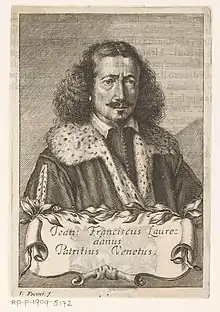Giovanni Francesco Loredano
Giovanni Francesco Loredan (or Loredano) (Venice, 27 February 1607 - Peschiera, 13 August 1661) was a Venetian writer and politician.[1][2][3]

Biography
Giovanni Francesco Loredan was in Venice son of Lorenzo Loredan and Leonora Boldù. When both of his parents died while he was very young, he was raised by his uncle Antonio Boldù and had as his teacher Antonio Colluraffi, repeatedly mentioned in the publications of the Accademia degli Incogniti[4]
He divided his youth between hard study and an extravagant lifestyle. He attended the classes of renowned Aristotelian philosopher Cesare Cremoni in Padua and began, before 1623, to gather around him that group of scholars who then formed the Accademia degli Incogniti. As founder of the Accademia degli Incogniti and a member of many other Academies, he had close contact with almost all the scholars of his time. He and his circle played a decisive role in the creation of modern opera[5] In addition to literary activity, he also took part in public affairs. At twenty he was recorded in the golden book, but his career began quite late: in September 1632 he was elected 'Savio agli Ordini' and in 1635 he was Treasurer of the fortress of Palmanova. On his return he reorganized the Accademia degli Incogniti (1636) and, in 1638, despite attempts to avoid it, he was obliged, as the only descendant of his branch, to contract marriage with Laura Valier.[6] He was then Provveditore ai Banchi (1640), 'Provveditore alle Pompe' (1642), and in 1648 he made the leap to the rank of avogador del comun that he held several times (1651, 1656 and 1657) and 'Provveditore alle Biave'(1653). He subsequently joined the offices of the State Inquisitor and became a member of the Council of Ten. In 1656 he entered the Minor Consiglio, that is, among the six patricians who, together with the doge, composed the Serenissima Signoria. However, he may then have been pushed out of office, as in the following years he no longer held important positions. In 1660 he was a Provveditore in Peschiera. The following year (13 August 1661) he died.
Works
In addition to the Scherzi Geniali (Sarzina, Venice, 1632) he wrote novels that were reprinted numerous times and also translated into French, such as La Dianea (Venice, Sarzina, 1635) and L'Adamo (Venice, Sarzina, 1640), operettas of religious subjects, as Sensi di devozione sui Sette, (Venice, Guerigli, 1652); Life of Alexander the Pope, (Venice, Sarzina, 1637); Life of St. John the Bishop of Trogir, (Venice, Guerigli, 1648); I gradi dell'anima, (Venezia, Guerigli, 1652), collections of academic essays (Bizzarrie accademiche, Venezia, Guerigli, 1655), Sei dubi amorosi (ivi, Sarzina, 1632); Il cimiterio; epitafi giocosi (together with Pietro Michiel, Tivoli, Mancini 1646), a comic Iliad (Venice, 1654), historical compilations Ribellione e morte del Valestain, under the pseudonym of Gnaeo Falcidio Donaloro, Milan, Ghisolfi, 1634 which cost him a warning by the Inquisitors of State, Istoria de 're Lusignani, with the pseudonym of Enrico Giblet, Bologna, Monti, 1647), a Vita del Marino (Venice, Sarzina, 1633), a collection of Letters still under the pseudonym of E Giblet (Venice, Guerigli, 1653). As founder of the Accademia degli Incogniti he edited the publications of the collective works of the Academy:Cento Novelle, Venezia, Guerigli, 1651; Discorsi accademici, Venezia Sarzina, 1635; Le glorie degli incogniti, Venezia, Valvasense, 1647; Novelle amorose, Venezia, eredi del Sarzina, 1641.[7]
Secondary Sources
- Accademico Eteroclito (Francesco Maidalchino), Il Loredano. Panegirico, Venezia 1634.
- G. Brunacci, Vita di Giovan Francesco Loredan, Venezia 1662.
- A. Lupis, Vita di Giovan Francesco Loredan senator veneto, Venezia 1663.
- V. Brocchi, L'accademia e la novella nel Seicento: Giovan Francesco Loredan, "Atti del R. Istituto veneto di scienze, lettere e arti", s. 7, IX (1897–98), pp. 284–311.
- N. Ivanoff, Giovan Francesco Loredan e l'ambiente artistico a Venezia nel Seicento, "Ateneo veneto", III 1965, pp. 186–190.
- A. Morini, Sous le signe de l'inconstance. La vie et l'oeuvre de Giovan Francesco Loredan (1606-1661), noble vénitien, fondateur de l'Académie des Incogniti, diss., Université de Paris IV, 1994.
- A. Morini, Giovan Francesco Loredan: sémiologie d'une crise, "Revue des études italiennes", XLIII 1997, pp. 23–50.
- M. Miato, L'Accademia degli Incogniti di Giovan Francesco Loredan. Venezia (1630-1661), Firenze 1998.
- A. Morini, Giovan Francesco Loredan (1606-1661): le retour à la bergerie, in: Soulèvements et ruptures: l'Italie en quête de sa révolution. Actes du Colloque du CSLI, a cura di B. Toppan, Nancy 1998, pp. 73–88.
- Giovan Francesco Loredano, Morte del Volestein e altre opere, a c. di L. Manini, La Finestra editrice, Lavis 2015 ISBN 978-8895925-60-8.
- Rosand, Ellen, Opera in Seventeenth-Century Venice: the Creation of a Genre. University of California Press, 2007 ISBN 978-0-520-25426-8 ISBN 0520254260
See also
References
- "Lo incendio : comedia del sig. Gio. Francesco Loredano". trove.nla.gov.au. Trove, National Library of Australia.
- "Loredano, Giovanni Francesco, 1607-1661". quod.lib.umich.edu. University of Michigan.
- "Loredano, Giovanni Francesco 1607-1661". worldcat.org. WorldCat.
- M. Miato, L'Accademia degli Incogniti di Giovan Francesco Loredan. Venezia (1630-1661), Firenze 1998.
-
- Rosand, Ellen, Opera in Seventeenth-Century Venice: the Creation of a Genre. University of California Press, 2007 ISBN 978-0-520-25426-8 ISBN 0520254260
- G. Brunacci, Vita di Giovan Francesco Loredan, Venezia 1662.
- A. Lupis, Vita di Giovan Francesco Loredan senator veneto, Venezia 1663.
External links
Carminati, Clizia (2005). "Loredan, Giovan Francesco". Dizionario Biografico degli Italiani, Volume 65: Levis–Lorenzetti (in Italian). Rome: Istituto dell'Enciclopedia Italiana.